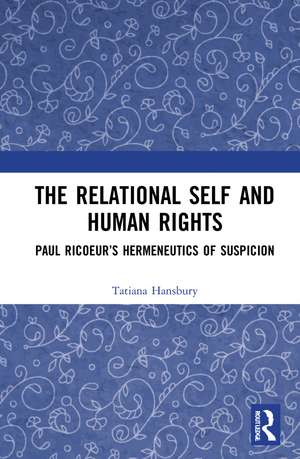The Relational Self and Human Rights: Paul Ricoeur’s Hermeneutics of Suspicion: Birkbeck Law Press
Autor Tatiana Hansburyen Limba Engleză Paperback – 29 ian 2024
Many schools of critical theory argue that the idea of human rights is based on a problematic conception of the human subject and the legal person. For liberals, the human is a possessive and self-interested individual, such that others are either tools or hurdles in their projects. This book offers a novel reading of subjectivity and rights based on Paul Ricœur’s re-interpretation of human subjectivity as a relational concept. Taking up Ricoeur’s idea of recognition as a ‘reciprocal gift’, it argues that gift exchange is the relation upon which authentic, non-abstract, human subjectivity is based. Seen in this context, human rights can be understood as tokens of mutual recognition, securing a genuinely human life for all. The conception of human rights as gift effectively counters their moral individualism and possessiveness, as the philosophical anthropology of an isolated ego is replaced by that of a related, dependent and embedded self.
This original reinterpretation of human rights will appeal to scholars of legal theory, jurisprudence, politics and philosophy.
| Toate formatele și edițiile | Preț | Express |
|---|---|---|
| Paperback (1) | 389.66 lei 6-8 săpt. | |
| Taylor & Francis – 29 ian 2024 | 389.66 lei 6-8 săpt. | |
| Hardback (1) | 1000.76 lei 6-8 săpt. | |
| Taylor & Francis – 19 mai 2022 | 1000.76 lei 6-8 săpt. |
Din seria Birkbeck Law Press
- 15%
 Preț: 566.66 lei
Preț: 566.66 lei -
 Preț: 484.47 lei
Preț: 484.47 lei -
 Preț: 349.80 lei
Preț: 349.80 lei - 31%
 Preț: 322.47 lei
Preț: 322.47 lei - 48%
 Preț: 254.60 lei
Preț: 254.60 lei - 15%
 Preț: 427.16 lei
Preț: 427.16 lei - 15%
 Preț: 470.72 lei
Preț: 470.72 lei - 5%
 Preț: 392.48 lei
Preț: 392.48 lei -
 Preț: 442.62 lei
Preț: 442.62 lei -
 Preț: 407.40 lei
Preț: 407.40 lei -
 Preț: 415.24 lei
Preț: 415.24 lei -
 Preț: 486.42 lei
Preț: 486.42 lei -
 Preț: 467.06 lei
Preț: 467.06 lei -
 Preț: 405.66 lei
Preț: 405.66 lei -
 Preț: 443.27 lei
Preț: 443.27 lei -
 Preț: 440.77 lei
Preț: 440.77 lei - 12%
 Preț: 300.09 lei
Preț: 300.09 lei -
 Preț: 465.69 lei
Preț: 465.69 lei - 12%
 Preț: 299.52 lei
Preț: 299.52 lei -
 Preț: 389.38 lei
Preț: 389.38 lei -
 Preț: 389.66 lei
Preț: 389.66 lei -
 Preț: 387.58 lei
Preț: 387.58 lei - 18%
 Preț: 1004.24 lei
Preț: 1004.24 lei
Preț: 389.66 lei
Nou
Puncte Express: 584
Preț estimativ în valută:
74.56€ • 78.13$ • 61.64£
74.56€ • 78.13$ • 61.64£
Carte tipărită la comandă
Livrare economică 11-25 aprilie
Preluare comenzi: 021 569.72.76
Specificații
ISBN-13: 9781032249100
ISBN-10: 1032249102
Pagini: 206
Dimensiuni: 156 x 234 mm
Greutate: 0.45 kg
Ediția:1
Editura: Taylor & Francis
Colecția Birkbeck Law Press
Seria Birkbeck Law Press
Locul publicării:Oxford, United Kingdom
ISBN-10: 1032249102
Pagini: 206
Dimensiuni: 156 x 234 mm
Greutate: 0.45 kg
Ediția:1
Editura: Taylor & Francis
Colecția Birkbeck Law Press
Seria Birkbeck Law Press
Locul publicării:Oxford, United Kingdom
Public țintă
Postgraduate and UndergraduateCuprins
Introduction
- Outline of the problem
- The ‘relational turn’
- Challenges to the reconceptualisation of rights
- The approach
- Why Ricœur?
- Structure
- The evolution and critique of liberal subjectivity and rights
- The others of liberalism: communitarianism and relational theory on the rightful place for rights
- Addressing entrenchment and indeterminacy
- The limits of reinvention: human rights as tradition and critique
- Self as relation
- Human rights as relations
- Rights as formal relations
- Rights as ‘suprapersonal existences’
- Concluding remarks; rights’ discursive existence
- In search of the self: the structure of a hermeneutical inquiry
- Idem and ipse: the dialectics of selfhood and sameness
- Ipseity as commitment to being: narrative and promise
- Narrative identity and a relational subject of rights
- Promise: ethical self-maintenance
- Capacities, incapacities and rights
- Esteem and respect: the link between capacities and rights
- An incapable subject: a relational corrective
- Attestation and trust: epistemology of subjectivity
- Concluding remarks: relational subject of rights as a ‘life’
- Neighbour as an encounter: you and I
- Alterity, ‘othering’, reciprocity and likeness
- ‘Who is my neighbour?’: solicitude and equality
- Neighbour as the institution
- .Neighbour as the institutional other
- The ‘problematic role of the state’
- ‘In just institutions’
- Concluding remarks: subject of rights as ‘neighbour’
- Rights and gifts: rivals or allies?
- Mutual recognition as reciprocal gift
- Resistance is futile: the ‘struggle for recognition’ questioned
- Gift as the source of reciprocal obligations
- Gift and the recognition/redistribution divide
- ‘Ownership is not what matters’: human rights as the gifted property of persons
- Questioning the property metaphor
- Rights between givers
- ‘A rally of the really human things’: the priceless objects of rights
- The facets of the priceless
- ‘Life’ and ‘dwelling’ as purposive spheres of human rights
Notă biografică
Tatiana Hansbury, Birkbeck Law School, University of London.
Descriere
This book takes up Paul Ricoeur’s relational idea of the self in order to rethink the basis of human rights.
